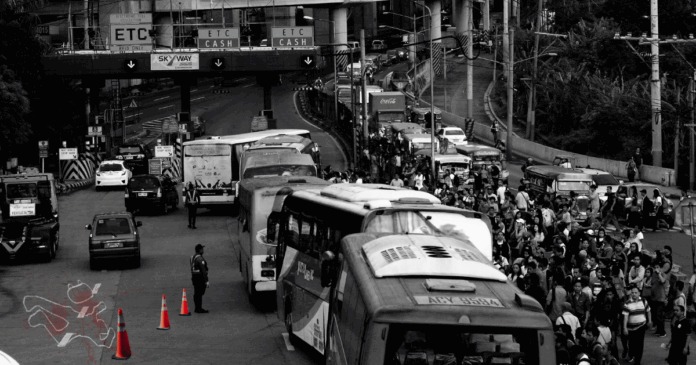News reports continue to be filled with incidents involving the temper of some motorists, often leading to road altercations. More commonly known as “road rage,” these unwanted flares can sometimes escalate into violence or, worse, fatalities.
One case that drew public attention was the road rage incident in Antipolo, which ended in a shooting and the tragic loss of life. Motorists may eventually reach their destination, others may evade justice, but the lives lost due to uncontrolled anger can never be brought back.
Even President Ferdinand “Bongbong” Marcos Jr. has expressed concern over the increasing reports of road rage incidents across the country. He issued a message to the public during the Holy Week, urging everyone to remain calm and exercise patience on the road.
“Ang tatapang na natin lahat! Siga lahat! Ano na ba ang kulturang ito na pagiging siga sa daan. Saan ba natin nakuha ito? Ano na bang nangyayari sa atin at parang natural na lang ang mga ganitong komprontasyon at karahasan. Tayong lahat ay kailangang sumunod sa batas-trapiko,” the President said on his vlog last April 14.
“Kailangan ang disiplina para maging responsableng mga Pilipino sa lansangan. Wag maging kamote!” he reiterated.
The Chief Executive also emphasized that driving is a privilege, not a right, adding that motorists must learn to improve their behavior when it comes to driving.
“Ang bagong Pilipino ay disiplinado sa lansangan. Maingat sa pananalita. Nagtitimpi at pinipili ang kapayapaan. Ang lahat ay napag-uusapan nang maayos at malumanay.”
Meanwhile, Marcos acknowledged that certain situations on the road such as heavy traffic and undisciplined drivers who disregard traffic rules, can be frustrating. However, he urged the motoring public to practice patience.
“Pasensya na lang, palampasin n’yo na lang. Ano naman ang mawawala sa atin, one second, five seconds, twenty seconds… pagbigyan na natin at huwag na natin patulan,” he said.
The Impact of Road Rage: Is Depression, Poverty, or Mental Health to Blame?
Road rage, an all-too-familiar phenomenon on congested streets and highways, is more than just aggressive driving. It’s a complex issue deeply intertwined with mental health, affecting individuals and communities alike. Defined as extreme anger or aggression exhibited by drivers on the road, road rage manifests in various forms, from verbal insults and rude gestures to dangerous maneuvers that endanger lives.
On GMA Network’s “Dapat Alam Mo!,” Philippine Advocates for Road Safety director June Estallo explained that several factors contribute to motorists losing their temper, including environmental and road conditions and the increasing number of vehicles.
“Hindi na na-accommodate ng ating lansangan ang biglang pagdami ng ating sasakyan. So, kaakibat na no’n ang umiinit ang ulo ng isang driver, ng isang motorista, unang-una dahil sa traffic. Frustration niya na nahuhuli siya sa pagpasok niya sa trabaho, at masama rin ang panahon, mainit masyado,” he explained.
When faced with an extremely angry motorist, there are only two possible responses: to be confrontational or to practice avoidance.
“Iwasan mo. Pero kung nakikita mong napaka-eminent na ang pag-amba, puwede mo siyang layasan at humanap ka ng pinakamalapit na police station, iparada mo roon,” he added.
Meanwhile, Dr. Dwight Hennessy, a professor and chair of the Psychology Department at Buffalo State University, shared his insights on Speaking of Psychology, the flagship podcast of the American Psychological Association.
Hennessy, who has been interviewed by media outlets such as The New York Times, CBC, and The Seattle Times, explained that driving is generally stressful. Combine this with heavy traffic can be a recipe for disaster.
“In our discipline, there’s different ideas about those. Road rage is usually referred to as the major things, like the really dramatic violent kinds of actions, whereas we tend to talk about driver aggression as maybe the more mild things that happen.”
“Where road rage might be something like a physical altercation where somebody gets out, they tend to be more dramatic, the outcomes tend to be more severe, whereas aggression might be seemingly more trivial, although I will argue that those seemingly trivial things often escalate and they pile up and they pile up, but honking a horn at somebody, yelling, shooting the finger, things like that. So, when I say mild, they don’t necessarily mean that these are things that we shouldn’t be concerned about. But I think in people’s everyday conversations that’s how they differentiate,” he said.
According to an article published on “Psychology Today,” road rage involves both emotion and the ability to regulate emotion.
Bjureberg and Gross (2021) propose a working definition of road rage as “a form of fairly intense behaviorally maladaptive anger often cued by driving-related stimuli while operating a vehicle or riding in one as a passenger.”
How to Ensure You are Not a Road Rager?
Here are some practical reminders:
- Give yourself enough time to get to your destination so you won’t feel pressured to drive aggressively or take risks.
- Prepare your car. Fill up your gas tank, bring your phone, input your destination into your GPS, and handle any other needs before heading out to avoid unnecessary stress. Your emotional state matters too.
- Don’t drive just to release frustration. Instead, ensure you’re calm and emotionally stable before getting behind the wheel—never drive while consumed by anger.
- Beyond steering clear of negative emotions, cultivating positive ones can also help create a safer driving environment. Safe driving depends on patience and empathy. Maybe that slow driver has a reason, or the hesitant one at a green light is simply being cautious.
Ultimately, we should all prioritize each other’s safety and aim to reach our destinations without harm, for our own sake and for those we care about.



